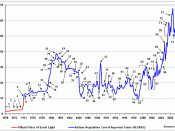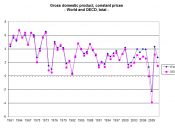Cartel TheoryEconomists have long investigated the impact regulation on firms, industries, and consumers. A consensus. A consensus has formed that, under certain conditions, regulation by government is sought by members of an industry to inhibit entry thereby raising prices and incomes within that industry. Such results may also arise through cartel agreements between industry members. However, without intervention by a central authority (such as the government) cartel agreements almost invariably fail, either because of free-riding behavior, outright cheating, or entry by new competitors. Government regulation, through the coercive powers granted to it by the populace, may be viewed as a substitute for cartel arrangements when regulation excluded or limits entry by new firms thereby creating markets with non-competitive prices. In special cases where firms have ties among each other both as suppliers and consumers, intervention by a coercive agent may be unnecessary. Such a situation exists today in the horse industry, Horse registries regulate the production techniques that members use to breed mares.
Foals that are not produced in accordance with the registry's rules are not allowed to participate in breed events such as racing and showing and thereby forfeit the opportunity to complete for substantial economic gain. (Pindyck, 2007)In a competitive setting, demand for oil will be met first from low cost areas, and then as cost curves intersect, from higher and higher cost areas. Let us now introduce the time dimension. In a dynamic context, the combination of low, competitive oil prices unburdened by taxation and economic growth will stimulate demand. Would oil prices rise then? This depends on whether or not the rate of discovery and development of low cost oil resources keeps up with the growth in demand. Price rises, if they occur, may not lead to an immediate return of substitutes however. This is partly...


